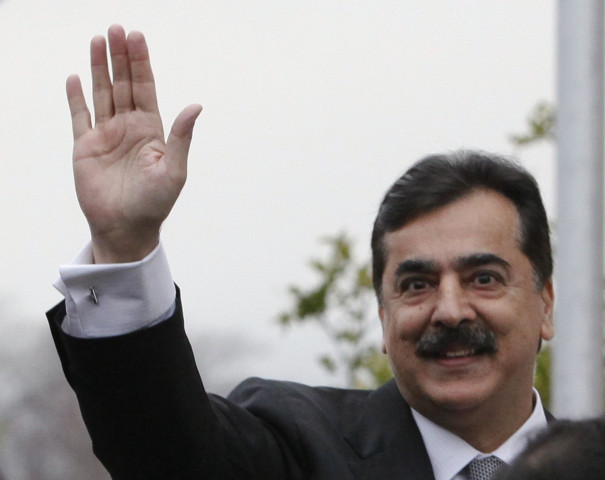Legal experts disagree on the way out for Gilani
There is unanimous agreement, however, that if the PM writes the letter, charges will be dropped.

The executive and the judiciary have reached the point of no return at the end of a four-year love story, raising the question for everyone else: what will happen next?
The country’s top legal and constitutional experts seem to be divided on the question of whether the president can pardon the prime minister, if he is convicted by the court. Will the PM lose his seat right after his conviction, or are there procedures within the Constitution which must first be adopted? And what legal options are available to the PM for his survival in this battle in the apex court?
Ex-chief justice of Pakistan justice Saeeduz Zaman Siddiqui is of the view that the president cannot pardon the PM if he is convicted by the court because, according to the Constitution, the president is bound to act upon the advice of the PM.
On the question of disqualification, Justice (retd) Siddiqui said: “It depends on the court’s verdict. If the court simply declares him convicted, then the question of disqualification will arise before the speaker of the National Assembly, who will refer the question to the Election Commission of Pakistan within 30 days. The ECP, within 90 days, will de-seat him but if the court convicts him and disqualifies him, then no such procedure is required.”
Contrary to this point of view, Senior Advocate Abid Hassan Manto said the president can pardon the PM under article 45 of the Constitution, like he did in the case of Rehman Malik.
He said that even if the Supreme Court convicts the PM and disqualifies him, Article 63 of the Constitution regarding disqualification from Parliament will have to be adopted, adding that the PM will have a right of appeal even after the final verdict of the court.
Senator S M Zafar said that under the law of necessity the president can grant a pardon to the PM without the PM’s or anyone’s advice, but the pardon will be for the sentence – and the conviction will remain intact. Therefore the premier will be disqualified from Parliament as per the procedure available in Article 63.
He said after his conviction and
rejection of appeal, the speaker will write to the election commission within 30 days and the election commission will decide the matter in 90 day; meanwhile Gilani can remain prime minister.
Senator Zafar said that the court can set the PM free with a warning, but can also send him behind bars for 3 to 6 months.
Justice (retd) Wajihud Din Ahmad said that the president can pardon the sentence, but a conviction will remain, though can be challenged in the court on the basis of mala fide intention of the president and the common interest between them.
He said that disqualification would follow this procedure: the court itself will determine the case and, invoking article 63-G the court will ask the registrar to inform the NA’s speaker and the election commission of the verdict. The verdict will then be implemented and the PM will be disqualified.
Although experts differed on the issues which could arise in the coming days, they had a unanimous view that if the premier writes a letter to the Swiss authorities for reopening of cases against President Zardari, even at this stage, the contempt of court case against him will be finished subsequently.
Published in The Express Tribune, February 14th, 2012.



















COMMENTS
Comments are moderated and generally will be posted if they are on-topic and not abusive.
For more information, please see our Comments FAQ